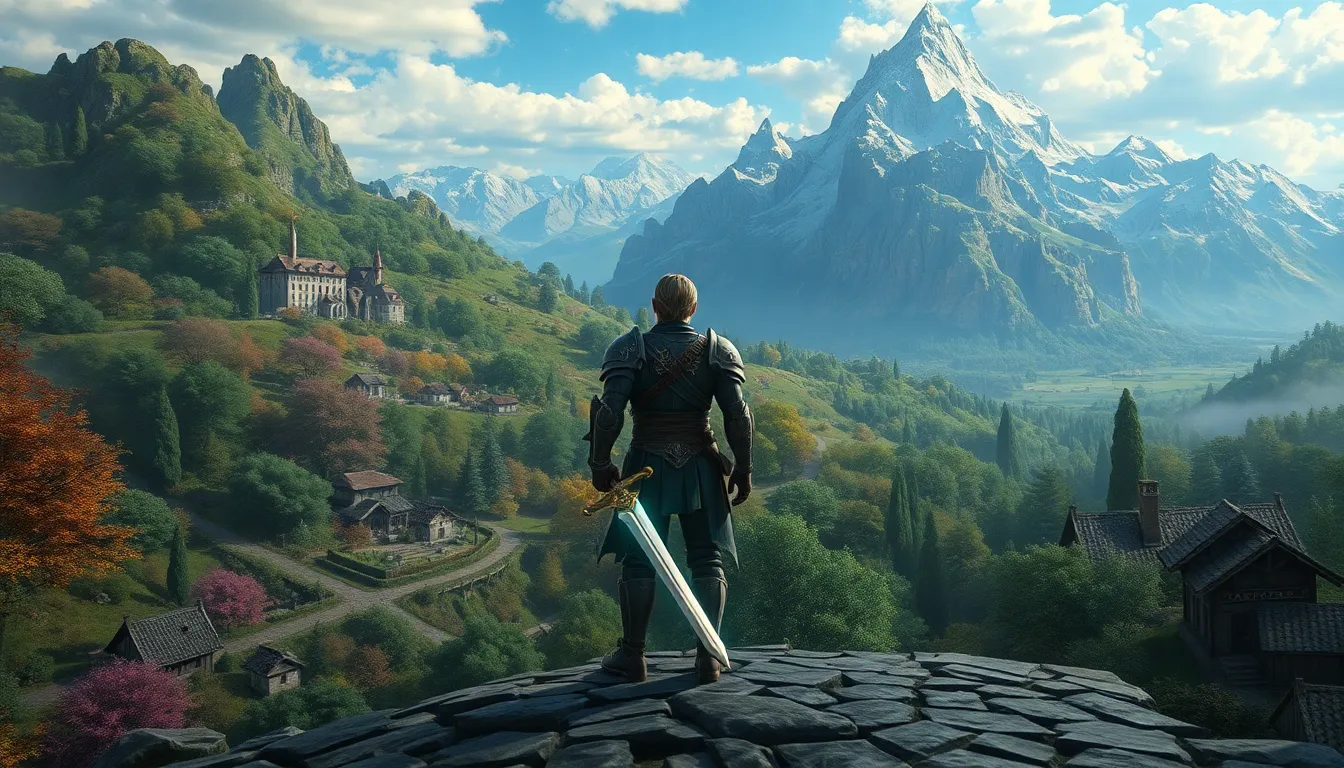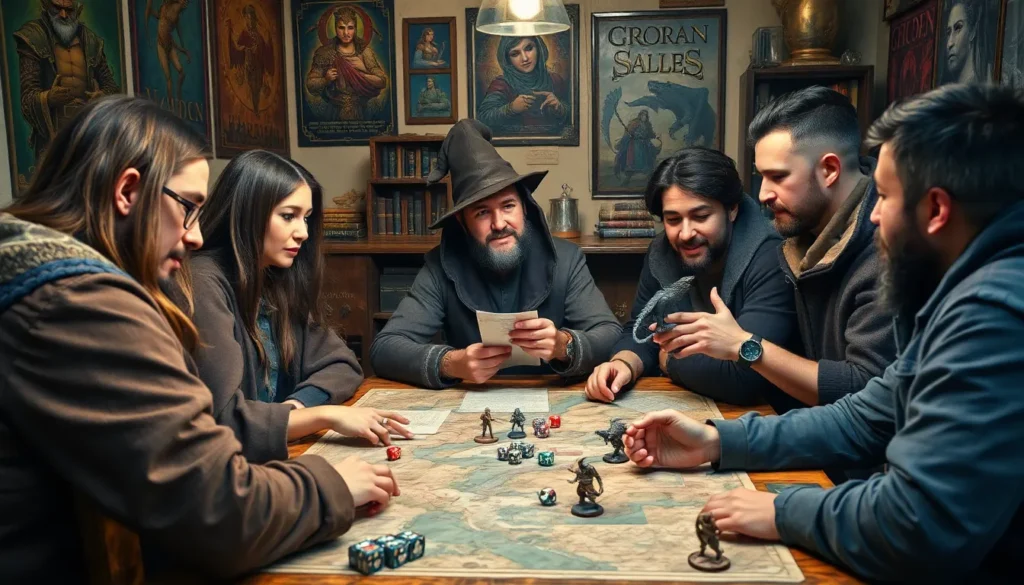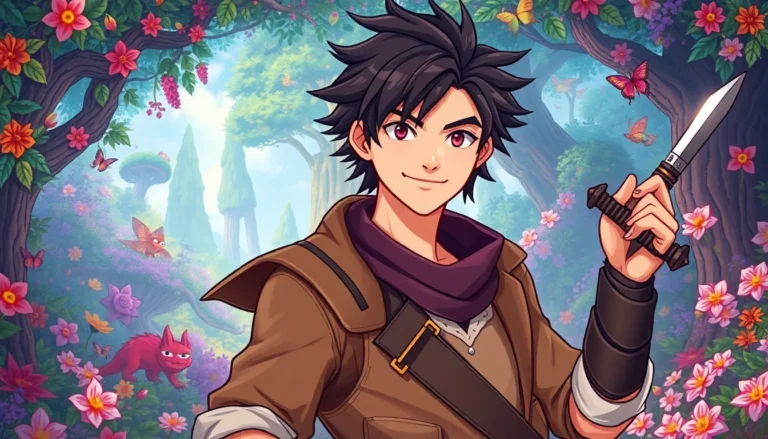In a world where imagination reigns supreme, fantasy RPGs transport players to realms filled with magic, epic quests, and unforgettable characters. These immersive games allow individuals to step into the shoes of heroes and villains alike, crafting their own narratives and shaping destinies. With rich lore and intricate gameplay mechanics, fantasy RPGs offer an escape from reality that captivates millions.
Whether battling fearsome dragons or forging alliances with mystical beings, players experience the thrill of adventure like never before. The genre has evolved over the years, blending traditional tabletop elements with cutting-edge technology to create experiences that resonate with both seasoned gamers and newcomers. As the popularity of fantasy RPGs continues to soar, exploring their unique features and impact on gaming culture becomes essential for understanding their enduring appeal.
Table of Contents
ToggleOverview of Fantasy RPG
Fantasy RPGs, or role-playing games, immerse players in rich, imaginative environments characterized by magic, mythical creatures, and heroic quests. Players assume the roles of characters, each equipped with unique abilities and backgrounds, allowing personalized storytelling and strategic interactions. This genre encourages creativity as players shape narratives through their decisions and actions.
The evolution of fantasy RPGs is notable, moving from traditional tabletop experiences to digital formats. Classic games like Dungeons & Dragons paved the way, establishing foundational mechanics and storytelling techniques. Modern video games, such as The Elder Scrolls and World of Warcraft, incorporate advanced graphics and multiplayer options, enhancing engagement and community interaction.
Key features of fantasy RPGs include character customization, skill progression, and a variety of quests—main questlines, side quests, and exploration activities. These elements contribute to an open-world experience where players can explore, conquer, or engage in diplomacy with diverse factions. Additionally, in-game economies often reflect realism, offering trade systems and crafting options that enrich gameplay.
Culturally, fantasy RPGs impact both gaming and storytelling by inspiring novels, films, and other media. They foster communities through conventions and online platforms, connecting enthusiasts worldwide. Understanding the elements that define fantasy RPGs highlights their enduring appeal and significance in entertainment.
Key Elements of Fantasy RPG

Fantasy RPGs thrive on several core elements that shape gameplay and player experiences. These components—world-building, character development, and game mechanics—contribute to the rich landscapes and narratives players explore.
World-Building
World-building defines the setting of a fantasy RPG, encompassing its lore, geography, and culture. Designers create intricate worlds with unique histories, magical systems, and diverse factions. For example, games like The Elder Scrolls exhibit extensive backstories and immersive environments. Players interact with varied terrains—forests, mountains, and cities—enhancing exploration. Detailed maps often guide players through quests, enabling them to discover hidden secrets or powerful artifacts.
Character Development
Character development involves creating and evolving player characters through choices and skill progression. Players select races—like elves or dwarves—and classes, such as warriors or mages, influencing abilities and playstyles. As characters gain experience, they unlock skills and enhance attributes, allowing for personalized tactics. Games often incorporate moral choices that affect character relationships and influence outcomes. For instance, decisions may lead to alliances or enmities with other factions, shaping the narrative dynamically.
Game Mechanics
Game mechanics form the rules and systems governing interactions in fantasy RPGs. Combat systems vary widely, from turn-based strategies to real-time battles. Status effects and resource management add layers of complexity. Inventory systems typically revolve around collecting gear, potions, and crafting materials. Multiplayer mechanics foster cooperation or competition, encouraging players to team up for challenging quests or engage in player-versus-player battles. Exploration mechanics, including stealth, jumping, or climbing, also enhance immersion by allowing players to uncover the world at their pace.
Popular Fantasy RPGs
Fantasy RPGs span a wide range of titles, from classic genre-defining games to innovative modern releases. Each game contributes unique mechanics and storytelling techniques, enriching the overall experience.
Classic Titles
Classic fantasy RPGs set the foundation for the genre. Players fondly remember the following titles:
- Dungeons & Dragons: This tabletop RPG, launched in 1974, introduced the concept of character-driven storytelling and strategic combat.
- Final Fantasy series: Beginning in 1987, this series blends intricate plots and character development with engaging turn-based combat.
- The Legend of Zelda: Since 1986, players have enjoyed exploring expansive worlds filled with puzzles and quests.
- Chrono Trigger: Released in 1995, this title features a compelling time travel narrative with multiple endings, influencing future RPGs.
- Baldur’s Gate: This 1998 title popularized the use of real-time and turn-based combat in a detailed fantasy world.
Modern Releases
- The Elder Scrolls V: Skyrim: Released in 2011, this open-world RPG offers players extensive customization and a richly detailed environment.
- Dark Souls series: Known for its challenging combat and deep lore, this series has redefined difficulty and player engagement since 2011.
- The Witcher 3: Wild Hunt: Since 2015, this game has captivated players with its intricate narrative and branching choices, showcasing the impact of player decisions.
- Final Fantasy XIV: This MMORPG, revitalized in 2013, emphasizes cooperative play and an evolving world, fostering a strong community among players.
- Genshin Impact: Launched in 2020, this action RPG features a gacha system for character collection, blending exploration and combat in a visually stunning environment.
The Impact of Fantasy RPGs
Fantasy RPGs exert a significant influence on various aspects of culture and community. Their immersive storytelling and unique character experiences resonate widely, shaping entertainment and social interactions.
Cultural Influence
Fantasy RPGs heavily impact literature, film, and other media forms. They inspire countless novels and series through intricate world-building and character arcs, as seen in bestsellers like “The Name of the Wind” by Patrick Rothfuss and adaptations of games into films, such as the “Dungeons & Dragons” movie series. These games often introduce archetypes and narratives that permeate popular culture. Elements like epic quests, mythical creatures, and hero journeys frequently appear across different media platforms. Moreover, the success of fantasy RPGs spurred interest in genre-specific conventions and festivals, uniting fans and creators.
Community and Fandom
Fantasy RPGs foster vibrant communities and strong fandoms. Online platforms, forums, and social media enable enthusiasts to share experiences, strategies, and fan art. Players connect through conventions like Gen Con, where they participate in live game sessions and workshops. Community-driven content often emerges, including mods and expansions that enhance gameplay. These interactions facilitate an environment where creativity flourishes, further enhancing the overall experience. Through shared adventures, humor, and gaming strategies, players form lasting friendships that transcend geographical boundaries.
Fantasy RPGs offer a unique blend of creativity and adventure that captivates players across the globe. With their rich storytelling and immersive worlds they allow individuals to explore limitless possibilities. The genre’s evolution from tabletop games to digital platforms has only deepened its impact on culture and community.
As players engage in character development and strategic gameplay they not only embark on epic quests but also forge connections that last beyond the game. The vibrant communities formed around these experiences highlight the enduring appeal of fantasy RPGs. Whether through classic titles or modern innovations the journey through these magical realms continues to inspire and entertain.








